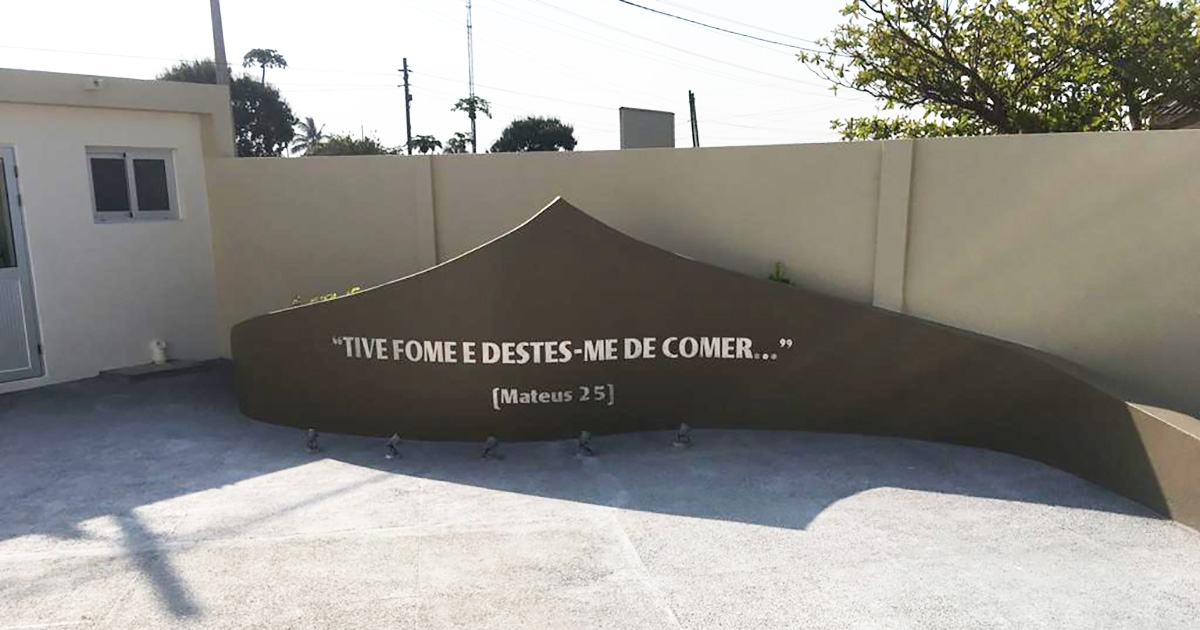The Matthew 25 Program is an activity of the Catholic Church in which she maintains her Christian-Catholic identity while offering support to those who are most poor and/or abandoned. This program is carried out in accord with Jesus’ words (Matthew 25:31-46) and responds to Pope Francis’ invitation to live as a church that reaches out to others, that opts for the existential peripheries of society … a church that places the poor in the first position so that she might become a poor church for people who are poor.
This ministry officially began on the evening of July 19, 2018 with the participation of the Daughters of Charity and the Franciscan Hospitaller Sisters of the Immaculate Conception.
During the first month and a half of our ministry two specific places on the Mao Tse Tung Avenue were chosen as meeting places: a park near the Standard Bank Feima and the second place was the parish church of Our Lady of Victory.
Each day about 70-120 people are served: children, young men and women, adults. These people find themselves in different situations of poverty: street children (all boys), car washers, alcoholics, drug addicts, former convicts and prisoners, homeless people, infirm people.
The importance of this ministry
Regardless of the fact that these people may or may not have a home, we feel this ministry should be continued for the following reasons: (a) we are able to remain connected with those people are in some situation of poverty and also able to understand their needs; (b) we are able to be a church that moves out to the existential peripheries of society; (c) many of the people whom we serve (about 70%) would not be received in their home and therefore need our presence and our assistance; (d) we are able to analyze the new cases that arise and hopefully send these children back home before the situation becomes impossible.
The approach and the objectives of the Matthew 25 Program
—This ministry is done between the hours of 7:00-8:00 pm. We go into action at this time even though children should be off the streets at 6:30pm. During the time of our ministry we enter into conversation with these street children: we know them by name, they share their story with us, we come to understand why they prefer to remain on the street, we begin to also understand their openness to receive assistance. At the same time, we are able to discover if they have some illness and we always encourage them to return to their families (when they are willing to do this, we accompany them on this journey). We also learn about the places where they sleep on the street.
—We meet with the children (and others in need) in the two above-mentioned places on Mao Tse Tung Avenue. This is a peaceful area and it provides us with an opportunity to speak and to pray with them. We follow this routine:
- We begin with the sign of the cross and a brief catechetical lesson that is based on a scriptural passage (a parable or some miracle story). At times we will also base our catechesis on the life of some saint. The catechesis is simple and utilizes images that are related to their everyday life. Our prayer time concludes with the Our Father, the Hail Mary and the blessing of the food.
- Then everyone washes their face and their hands (we provide soap and water and towels). This is an important gesture and is not simply a concern for good hygiene … this provides the participants with an opportunity “to cleanse themselves of the garbage and any and all images of garbage”. There is also the feeling of being purified after having prayed together.
- Then the food is distributed (each congregation/group/community has prepared some food). Again, it is important that these “guests” receive the food seated and that they are also able to eat the food while seated. We want to avoid any and all conflict that could arise with regard to the distribution of the food. We always want to bring out the best in those who are being served. It is important that these children begin to understand that it is possible to relate to one another in a calm, peaceful and friendly manner (there is no need for aggression/violence … an all too familiar reality for those who live on the streets).
- We do not want to give the impression that this program is only about the distribution of food. The food that is distributed is eaten in a specific place and everyone eats together and is on time for the meal. Sharing food together is as important as sharing the word and being together for even a brief time as a family.
Who participates in this program?
At the present time the following groups are involved in this program: the Daughters of Charity, the Franciscan Hospitaller Sisters of the Immaculate Conception, the Salesians (Sisters and Brothers), the Conceptionists, the Congregation of the Mission, the Franciscan Missionaries of Mary, the Mercy Alliance, the Community of Sant’Egidio, the parish of Saint Anthony (Polana), the Order of Friars Minor, the Shalom Community and the parish if Saint John the Evangelist (Malhangalene). Any group that wishes to become involved in this ministry will be most welcomed.
By: the Apostolic Nunciature of Mozambique
Translated: Charles Plock, CM, Eastern Province, USA
Source: cmglobal.org








0 Comments